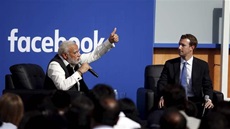Content from the Brookings Institution India Center is now archived. After seven years of an impactful partnership, as of September 11, 2020, Brookings India is now the Centre for Social and Economic Progress, an independent public policy institution based in India.
Jack Karsten and Darrell M. West writes about how social media services are impacting the way citizens communicate with their government the relationship between tech companies and world leaders.
The end of September saw several events that highlight the growing importance of the U.S. technology sector in global affairs. On September 26, Facebook CEO Mark Zuckerberg spoke at the UN General Assembly meeting in New York, where he discussed his company’s efforts to expand Inte rnet access in developing countries. A day later, Zuckerberg was back at Facebook headquarters in Menlo Park, California to host Indian Prime Minister Narendra Modi. In the past, technology companies might have relied upon Washington diplomats to convey their foreign policy preferences. Today, the size and reach of U.S. technology giants allows their CEOs to bypass Washington and communicate directly with world leaders.
rnet access in developing countries. A day later, Zuckerberg was back at Facebook headquarters in Menlo Park, California to host Indian Prime Minister Narendra Modi. In the past, technology companies might have relied upon Washington diplomats to convey their foreign policy preferences. Today, the size and reach of U.S. technology giants allows their CEOs to bypass Washington and communicate directly with world leaders.
Silicon Valley has become an increasingly popular destination for visiting foreign leaders who want to emulate the region’s success in their own countries. At the same time, technology companies with global ambitions can attract the support they need to expand in foreign markets.
The relationship between tech companies and world leaders extends beyond economic development, however. The social media services that Facebook, Twitter, and other companies provide are having an impact on how citizens communicate with their government. Speaking to Facebook staff, Prime Minister Modi acknowledged that “the strength of social media is it can tell government where they are going wrong…We used to have elections every five years. Now we have them every five minutes.” Given the civic empowerment that Internet access grants, it is perhaps unsurprising that Mark Zuckerberg urged the UN General Assembly to enshrine Internet access as a human right.
Putting the Internet within reach of every person on the planet may soon become a reality. The proliferation of inexpensive mobile devices around the world offers billions of potential access points that only need a wireless signal for Internet access and a solar panel for charging. Google and Facebook will soon launch satellite-connected balloons and drones that can broadcast a wireless signal over a large area. Wireless Internet service will allow communities without paved roads, phone lines, or an electrical grid to receive information from around the world. By supplying wireless communications infrastructure, technology companies will be able to reach an unprecedented amount of the world’s population.
Expanding Internet access could have important consequences for new Internet users in developing countries. In their efforts to deliver free mobile Internet access, will Google and Facebook grant access to their competitors’ services? Facebook’s Internet.org initiative to provide free mobile Internet access was met with protests in India over the program’s suite of applications, and Facebook has since added new features and rebranded its service as Free Basics. As technology companies push for universal Internet access, they will shape the experience of new Internet users.
The expanding reach of technology giants could have profound implications for future global politics. Now that these companies are valued at the same level as the GDPs of small countries and have a number of active users that rival the populations of large countries, it is unsurprising that they are playing a larger role on the world stage. Free Internet access is a benefit that poor governments are not able to provide themselves, so a partnership with technology companies could be a huge benefit to their citizens. These partnerships could enable billions of people to gain the benefits of the technology revolution.
Jack Karsten, Center Coordinator, Governance Studies, Center for Technology Innovation
Darrell M. West, Vice President and Director, Governance Studies, Founding Director, Center for Technology Innovation
The Brookings Institution is committed to quality, independence, and impact.
We are supported by a diverse array of funders. In line with our values and policies, each Brookings publication represents the sole views of its author(s).



Commentary
Op-edTechnology giants bypass Washington to reach world leaders
Brookings.edu
October 23, 2015